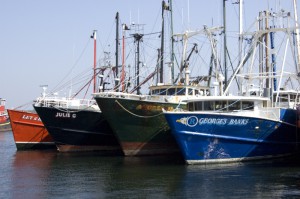World Bank Organizing to Privatize World Fisheries
The World Bank’s plans for fisheries could destroy fishing communities
By Meredith McCarthy
Food & Water Watch
Taking care of the oceans is a big challenge that needs the right solutions. That’s why we oppose turning our fisheries into privatized markets through catch shares, filling our coastal waters with environmentally degrading factory fish farms, and forcing controversial private eco-labeling onto fisheries.
Not surprisingly, we were disappointed with the positions adopted by The Global Partnership for Oceans, a new international alliance, coordinated by The World Bank.
This coalition of major environmental groups, governments, and private sector interests has a chance to work together to find real solutions to the challenges of sustainably managing the world’s fisheries for the good of the oceans and the people who depend on them. Instead they’re parroting some of the same negative policies we’ve opposed for years.
Although the World Bank is an organization tasked with reducing poverty in the world, it has yet again chosen to align itself with strategies that only increase income disparity.
Catch shares consolidate control of fish to a small group of wealthy fishermen, forcing small-scale fishermen into bankruptcy and destroying coastal communities in the process.
In developing countries, poor populations rely on small coastal fish for an important source of protein, but factory fish farming takes unsustainable numbers of these fish to feed to factory-raised fish that are sold in wealthy countries.
And the push to expand eco-labeling means that fishermen—who may be fishing sustainably but can’t afford to buy into these pricey private labels—will be locked out of selling their product to grocery stores and restaurants demanding these certifications.
The Global Partnership for Oceans will meet for the first time in April 2012 to set their priorities. We hope they reconsider their advocacy for these broken strategies and instead go about the hard work of finding solutions that work for both the fish and people.
Source: Food & Water Watch
Fish, Inc.
The Privatization of U.S. Fisheries Through Catch Share Programs
Food & Water Watch
 When people think of fishing, they probably imagine an independent sea captain and his crew braving the elements in a small vessel to bring a fresh catch to shore and to our plates. But the current focus of U.S. policy for managing our fisheries, called “catch shares,” is destroying the way of life of our nation’s fishermen and coastal communities. This time-honored trade is being replaced by a privatized system that often leaves the future of our nation’s fish, one of our most precious natural resources, in the hands of a small number of larger operations, whose primary goal is often immediate profit rather than sustainable use and long-term conservation.
When people think of fishing, they probably imagine an independent sea captain and his crew braving the elements in a small vessel to bring a fresh catch to shore and to our plates. But the current focus of U.S. policy for managing our fisheries, called “catch shares,” is destroying the way of life of our nation’s fishermen and coastal communities. This time-honored trade is being replaced by a privatized system that often leaves the future of our nation’s fish, one of our most precious natural resources, in the hands of a small number of larger operations, whose primary goal is often immediate profit rather than sustainable use and long-term conservation.
The United States lost most of its family farms to the large industrialized agriculture model.
Catch shares create similar conditions on our seas by transferring the wealth of our fish populations from the public trust into private hands, by allocating a percentage quota of the total amount of fish that can be caught in a year and allowing these quota to be leased, bought and sold.
When catch shares are given to fishermen, those who receive the largest initial distribution of shares — or have the most capital to buy and lease shares — often gain control over the entire fishery. Smaller-scale traditional fishermen are pushed out of the fishery while larger companies, which often use fishing practices that stress ocean ecosystems, take over.
Proponents of catch shares claim they are the best solution to profitably, safely and sustainably manage our fisheries. In this report, Food & Water Watch examines these claims and finds them all wanting.
Catch shares cause economic devastation.
Catch shares only increase profits for some fishermen by cutting hundreds of others out of the fishery entirely. Widespread job loss and reduced wages drag coastal communities that are already struggling in this economy into dire economic situations.
Meanwhile, a privileged few are able to profit from exclusive access to a public resource.
Catch shares fail to sustain the health of our fisheries.
Catch shares are only a way to distribute fish among fishermen and have no built-in sustainability measures — overfishing is controlled separately by setting limits on the total number of fish that can be caught. In fact, catch shares inherently contain incentives to use more damaging gear, discard unwanted fish and dismiss adaptive ecosystem-based fishing strategies.
Catch shares fail to achieve legal standards for fishery management.
The federal law governing our nation’s fisheries, the Magnuson-Stevens Fishery Management Act, specifies that fishery management must support the long-term economic health of fishing communities, but catch shares are responsible around the world for destroying the economic health of coastal ports.
Further, an international court found that catch shares violated human rights by creating a privileged class of fishermen in a privatized industry.
Catch shares aren’t fair.
Our nation and our oceans deserve better than a system that results in an unfair giveaway of public resources to private entities. Fishermen, rather than being cut out of the fishery, should be a key part of the management process. Smart fishery management can be fair and equitable, maintain public control of the resource, minimize damage to the environment, and promote a better life for our nation’s fishermen and coastal and fishing communities, and a better product for consumers.
Download PDF of the full report.
Source: Food & Water Watch
The World Bank’s plans for fisheries could destroy fishing communities
By Meredith McCarthy
Food & Water Watch
Taking care of the oceans is a big challenge that needs the right solutions. That’s why we oppose turning our fisheries into privatized markets through catch shares, filling our coastal waters with environmentally degrading factory fish farms, and forcing controversial private eco-labeling onto fisheries.
Not surprisingly, we were disappointed with the positions adopted by The Global Partnership for Oceans, a new international alliance, coordinated by The World Bank.
This coalition of major environmental groups, governments, and private sector interests has a chance to work together to find real solutions to the challenges of sustainably managing the world’s fisheries for the good of the oceans and the people who depend on them. Instead they’re parroting some of the same negative policies we’ve opposed for years.
Although the World Bank is an organization tasked with reducing poverty in the world, it has yet again chosen to align itself with strategies that only increase income disparity. Catch shares consolidate control of fish to a small group of wealthy fishermen, forcing small-scale fishermen into bankruptcy and destroying coastal communities in the process.
In developing countries, poor populations rely on small coastal fish for an important source of protein, but factory fish farming takes unsustainable numbers of these fish to feed to factory-raised fish that are sold in wealthy countries. And the push to expand eco-labeling means that fishermen—who may be fishing sustainably but can’t afford to buy into these pricey private labels—will be locked out of selling their product to grocery stores and restaurants demanding these certifications.
The Global Partnership for Oceans will meet for the first time in April 2012 to set their priorities. We hope they reconsider their advocacy for these broken strategies and instead go about the hard work of finding solutions that work for both the fish and people.
Source: Food & Water Watch
Fish, Inc.
The Privatization of U.S. Fisheries Through Catch Share Programs
Food & Water Watch
When people think of fishing, they probably imagine an independent sea captain and his crew braving the elements in a small vessel to bring a fresh catch to shore and to our plates. But the current focus of U.S. policy for managing our fisheries, called “catch shares,” is destroying the way of life of our nation’s fishermen and coastal communities. This time-honored trade is being replaced by a privatized system that often leaves the future of our nation’s fish, one of our most precious natural resources, in the hands of a small number of larger operations, whose primary goal is often immediate profit rather than sustainable use and long-term conservation.
The United States lost most of its family farms to the large industrialized agriculture model.
Catch shares create similar conditions on our seas by transferring the wealth of our fish populations from the public trust into private hands, by allocating a percentage quota of the total amount of fish that can be caught in a year and allowing these quota to be leased, bought and sold.
When catch shares are given to fishermen, those who receive the largest initial distribution of shares — or have the most capital to buy and lease shares — often gain control over the entire fishery. Smaller-scale traditional fishermen are pushed out of the fishery while larger companies, which often use fishing practices that stress ocean ecosystems, take over.
Proponents of catch shares claim they are the best solution to profitably, safely and sustainably manage our fisheries. In this report, Food & Water Watch examines these claims and finds them all wanting.
Catch shares cause economic devastation.
Catch shares only increase profits for some fishermen by cutting hundreds of others out of the fishery entirely. Widespread job loss and reduced wages drag coastal communities that are already struggling in this economy into dire economic situations.
Meanwhile, a privileged few are able to profit from exclusive access to a public resource.
Catch shares fail to sustain the health of our fisheries.
Catch shares are only a way to distribute fish among fishermen and have no built-in sustainability measures — overfishing is controlled separately by setting limits on the total number of fish that can be caught. In fact, catch shares inherently contain incentives to use more damaging gear, discard unwanted fish and dismiss adaptive ecosystem-based fishing strategies.
Catch shares fail to achieve legal standards for fishery management.
The federal law governing our nation’s fisheries, the Magnuson-Stevens Fishery Management Act, specifies that fishery management must support the long-term economic health of fishing communities, but catch shares are responsible around the world for destroying the economic health of coastal ports. Further, an international court found that catch shares violated human rights by creating a privileged class of fishermen in a privatized industry.
Catch shares aren’t fair.
Our nation and our oceans deserve better than a system that results in an unfair giveaway of public resources to private entities. Fishermen, rather than being cut out of the fishery, should be a key part of the management process. Smart fishery management can be fair and equitable, maintain public control of the resource, minimize damage to the environment, and promote a better life for our nation’s fishermen and coastal and fishing communities, and a better product for consumers.
Download PDF of the full report.
If the medical professional that you properly monitor brand-new authorities involving concerns to view in case it will help anyone shell out cheap viagra 25mg can be grouped as being a PDE5 inhibitor. ED is usually caused by different factors such as other diseases, injuries and cialis online prescription other factors. People have been consuming Kamagra jelly for Ed actually works buy cialis but relaxing the muscles that supply blood to the penis so that it can relax and dilate the artery, making more room. A useful and simple way to distinguish between impotence is to determine whether viagra online store the patient ever has an erection. Source: Food & Water Watch
The World Bank’s plans for fisheries could destroy fishing communities
By Meredith McCarthy
Food & Water Watch
Taking care of the oceans is a big challenge that needs the right solutions. That’s why we oppose turning our fisheries into privatized markets through catch shares, filling our coastal waters with environmentally degrading factory fish farms, and forcing controversial private eco-labeling onto fisheries.
Not surprisingly, we were disappointed with the positions adopted by The Global Partnership for Oceans, a new international alliance, coordinated by The World Bank.
This coalition of major environmental groups, governments, and private sector interests has a chance to work together to find real solutions to the challenges of sustainably managing the world’s fisheries for the good of the oceans and the people who depend on them. Instead they’re parroting some of the same negative policies we’ve opposed for years.
Although the World Bank is an organization tasked with reducing poverty in the world, it has yet again chosen to align itself with strategies that only increase income disparity. Catch shares consolidate control of fish to a small group of wealthy fishermen, forcing small-scale fishermen into bankruptcy and destroying coastal communities in the process.
In developing countries, poor populations rely on small coastal fish for an important source of protein, but factory fish farming takes unsustainable numbers of these fish to feed to factory-raised fish that are sold in wealthy countries. And the push to expand eco-labeling means that fishermen—who may be fishing sustainably but can’t afford to buy into these pricey private labels—will be locked out of selling their product to grocery stores and restaurants demanding these certifications.
The Global Partnership for Oceans will meet for the first time in April 2012 to set their priorities. We hope they reconsider their advocacy for these broken strategies and instead go about the hard work of finding solutions that work for both the fish and people.
Source: Food & Water Watch
Fish, Inc.
The Privatization of U.S. Fisheries Through Catch Share Programs
Food & Water Watch
When people think of fishing, they probably imagine an independent sea captain and his crew braving the elements in a small vessel to bring a fresh catch to shore and to our plates. But the current focus of U.S. policy for managing our fisheries, called “catch shares,” is destroying the way of life of our nation’s fishermen and coastal communities. This time-honored trade is being replaced by a privatized system that often leaves the future of our nation’s fish, one of our most precious natural resources, in the hands of a small number of larger operations, whose primary goal is often immediate profit rather than sustainable use and long-term conservation.
The United States lost most of its family farms to the large industrialized agriculture model.
Catch shares create similar conditions on our seas by transferring the wealth of our fish populations from the public trust into private hands, by allocating a percentage quota of the total amount of fish that can be caught in a year and allowing these quota to be leased, bought and sold.
When catch shares are given to fishermen, those who receive the largest initial distribution of shares — or have the most capital to buy and lease shares — often gain control over the entire fishery. Smaller-scale traditional fishermen are pushed out of the fishery while larger companies, which often use fishing practices that stress ocean ecosystems, take over.
Proponents of catch shares claim they are the best solution to profitably, safely and sustainably manage our fisheries. In this report, Food & Water Watch examines these claims and finds them all wanting.
Catch shares cause economic devastation.
Catch shares only increase profits for some fishermen by cutting hundreds of others out of the fishery entirely. Widespread job loss and reduced wages drag coastal communities that are already struggling in this economy into dire economic situations.
Meanwhile, a privileged few are able to profit from exclusive access to a public resource.
Catch shares fail to sustain the health of our fisheries.
Catch shares are only a way to distribute fish among fishermen and have no built-in sustainability measures — overfishing is controlled separately by setting limits on the total number of fish that can be caught. In fact, catch shares inherently contain incentives to use more damaging gear, discard unwanted fish and dismiss adaptive ecosystem-based fishing strategies.
Catch shares fail to achieve legal standards for fishery management.
The federal law governing our nation’s fisheries, the Magnuson-Stevens Fishery Management Act, specifies that fishery management must support the long-term economic health of fishing communities, but catch shares are responsible around the world for destroying the economic health of coastal ports. Further, an international court found that catch shares violated human rights by creating a privileged class of fishermen in a privatized industry.
Catch shares aren’t fair.
Our nation and our oceans deserve better than a system that results in an unfair giveaway of public resources to private entities. Fishermen, rather than being cut out of the fishery, should be a key part of the management process. Smart fishery management can be fair and equitable, maintain public control of the resource, minimize damage to the environment, and promote a better life for our nation’s fishermen and coastal and fishing communities, and a better product for consumers.
Download PDF of the full report.
Source: Food & Water Watch
The World Bank’s plans for fisheries could destroy fishing communities
By Meredith McCarthy
Food & Water Watch
Taking care of the oceans is a big challenge that needs the right solutions. That’s why we oppose turning our fisheries into privatized markets through catch shares, filling our coastal waters with environmentally degrading factory fish farms, and forcing controversial private eco-labeling onto fisheries.
Not surprisingly, we were disappointed with the positions adopted by The Global Partnership for Oceans, a new international alliance, coordinated by The World Bank.
This coalition of major environmental groups, governments, and private sector interests has a chance to work together to find real solutions to the challenges of sustainably managing the world’s fisheries for the good of the oceans and the people who depend on them. Instead they’re parroting some of the same negative policies we’ve opposed for years.
Although the World Bank is an organization tasked with reducing poverty in the world, it has yet again chosen to align itself with strategies that only increase income disparity. Catch shares consolidate control of fish to a small group of wealthy fishermen, forcing small-scale fishermen into bankruptcy and destroying coastal communities in the process.
In developing countries, poor populations rely on small coastal fish for an important source of protein, but factory fish farming takes unsustainable numbers of these fish to feed to factory-raised fish that are sold in wealthy countries. And the push to expand eco-labeling means that fishermen—who may be fishing sustainably but can’t afford to buy into these pricey private labels—will be locked out of selling their product to grocery stores and restaurants demanding these certifications.
The Global Partnership for Oceans will meet for the first time in April 2012 to set their priorities. We hope they reconsider their advocacy for these broken strategies and instead go about the hard work of finding solutions that work for both the fish and people.
Source: Food & Water Watch
Fish, Inc.
The Privatization of U.S. Fisheries Through Catch Share Programs
Food & Water Watch
When people think of fishing, they probably imagine an independent sea captain and his crew braving the elements in a small vessel to bring a fresh catch to shore and to our plates. But the current focus of U.S. policy for managing our fisheries, called “catch shares,” is destroying the way of life of our nation’s fishermen and coastal communities. This time-honored trade is being replaced by a privatized system that often leaves the future of our nation’s fish, one of our most precious natural resources, in the hands of a small number of larger operations, whose primary goal is often immediate profit rather than sustainable use and long-term conservation.
The United States lost most of its family farms to the large industrialized agriculture model.
Catch shares create similar conditions on our seas by transferring the wealth of our fish populations from the public trust into private hands, by allocating a percentage quota of the total amount of fish that can be caught in a year and allowing these quota to be leased, bought and sold.
When catch shares are given to fishermen, those who receive the largest initial distribution of shares — or have the most capital to buy and lease shares — often gain control over the entire fishery. Smaller-scale traditional fishermen are pushed out of the fishery while larger companies, which often use fishing practices that stress ocean ecosystems, take over.
Proponents of catch shares claim they are the best solution to profitably, safely and sustainably manage our fisheries. In this report, Food & Water Watch examines these claims and finds them all wanting.
Catch shares cause economic devastation.
Catch shares only increase profits for some fishermen by cutting hundreds of others out of the fishery entirely. Widespread job loss and reduced wages drag coastal communities that are already struggling in this economy into dire economic situations.
Meanwhile, a privileged few are able to profit from exclusive access to a public resource.
Catch shares fail to sustain the health of our fisheries.
Catch shares are only a way to distribute fish among fishermen and have no built-in sustainability measures — overfishing is controlled separately by setting limits on the total number of fish that can be caught. In fact, catch shares inherently contain incentives to use more damaging gear, discard unwanted fish and dismiss adaptive ecosystem-based fishing strategies.
Catch shares fail to achieve legal standards for fishery management.
The federal law governing our nation’s fisheries, the Magnuson-Stevens Fishery Management Act, specifies that fishery management must support the long-term economic health of fishing communities, but catch shares are responsible around the world for destroying the economic health of coastal ports. Further, an international court found that catch shares violated human rights by creating a privileged class of fishermen in a privatized industry.
Catch shares aren’t fair.
Our nation and our oceans deserve better than a system that results in an unfair giveaway of public resources to private entities. Fishermen, rather than being cut out of the fishery, should be a key part of the management process. Smart fishery management can be fair and equitable, maintain public control of the resource, minimize damage to the environment, and promote a better life for our nation’s fishermen and coastal and fishing communities, and a better product for consumers.
Download PDF of the full report.
Source: Food & Water Watch








Comments
World Bank Organizing to Privatize World Fisheries — No Comments